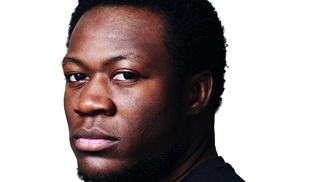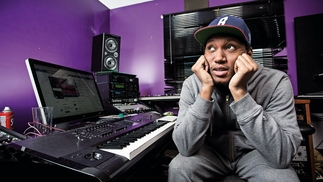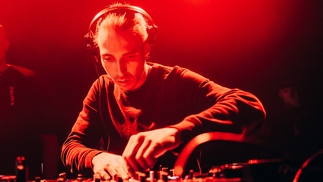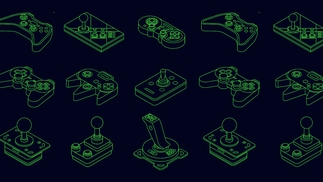GAME CHANGER: HATCHA
DJ Hatcha 'Dubstep Allstars Vol 1' (Tempa)
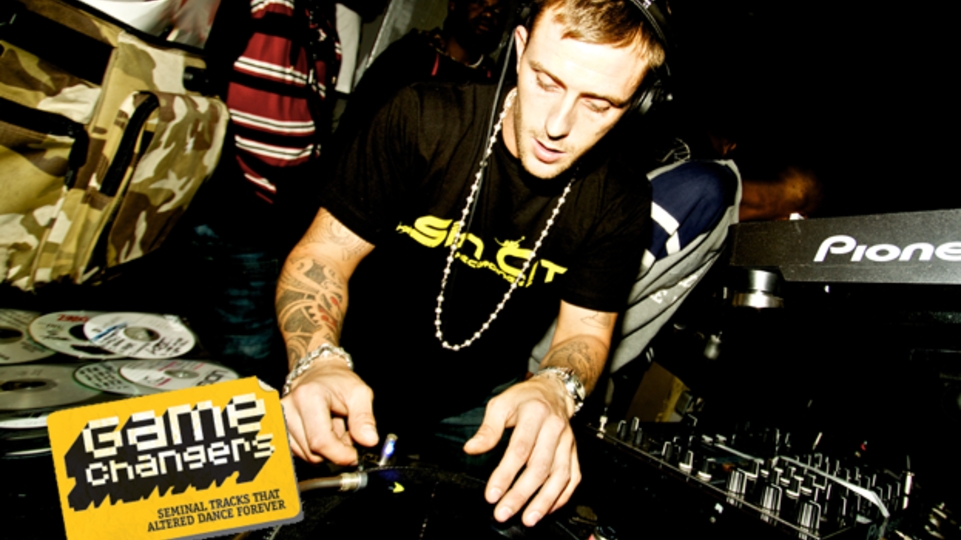
The Game Changer is taking a slightly different form this month. Usually it focuses on seminal tracks, but when it comes to the emergence of dubstep it was a compilation — mixed by DJ Hatcha from Croydon's Big Apple record shop — that truly kick-started the scene... Budding young garage DJ Terry Leonard, aka Hatcha, was just 16 or 17 when he started working in the Big Apple record shop in Croydon in the early noughties.
He'd been visiting the store for years, buying tunes, hanging out and getting to know the guys in the shop — like Artwork, and Skream's junglist older brother, Hijak. Skream, aka Ollie Jones, would often visit, and started saying how he was making tunes on the PlayStation program Music 2000.
“We kept encouraging him, staying positive towards him, and Benga was on the same tip — he had Music 2000 too,” remembers Hatcha. “They was making music, bringing in tapes and Minidiscs of little ideas they made, and then someone introduced them to a program called Fruity Loops. Once they had that, they was off!”
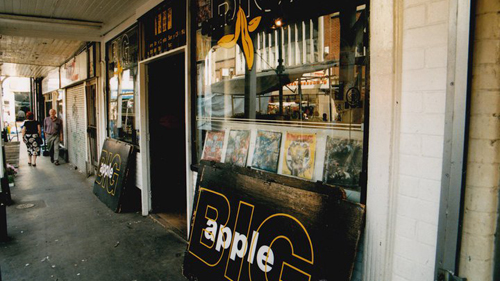
Caspa started coming into the shop too — “he was just getting into producing and DJing, I think he worked in a trainer shop at the time, and the same with Distance and Mala and Coki and Loefah,” says Hatcha. “All of these boys started to bring in music. It got to the stage where I had an arsenal of fucking beats.”
The stuff Hatcha had been increasingly playing out was the dubbed-out B-sides of UK garage and two-step tunes. “It was a deeper kind of garage, a tribally, more ambient kind of sound,” he says. “I was giving them Horsepower records, Zed Bias stuff, Madd Slinky, El-B, Phuturistix, I was giving these kids all these kinds of records and saying that I wanted this kind of style. I started incorporating all this into my sets on pirate radio. The next thing I knew, I had a couple of hours' sets every week of all this new music.”
Like Detroit, Croydon — about 10 miles south of central London — was known for car manufacture in the early part of the 20th century before becoming a service economy commuter town in the 1960s and seeing assorted office blocks spring up everywhere. It boomed for a while, but the last couple of decades have seen Croydon experience urban degeneration. Hatcha is unsure what part the nature of Croydon itself had to play on the emergence of dubstep, however.
“I think it was just timing,” he says. “There's not a lot for the kids in Croydon to do — or there wasn't really at the time. It was the right kids at the right time finding something that interested them, that captured their attention — ie. music production.
“Kids like Skream and Benga were 13, 14, 15 at the time — they were young, keen and eager,” he continues. “Croydon's not Chelsea, it's not a big money-orientated city. Of course there's money here, but it's not minted — we've got council estates around the area, we've got big high-rise blocks of flats, 80% of kids that come out of Croydon haven't been gifted with a silver spoon at birth... so for them to get their attention on something, it's always going to be things like music.
” The Big Apple shop was the big meeting point for young dance music headz as the new dubstep sound began to coalesce. “Everyone would be passing through Big Apple Records on a daily basis — right across the genre,” explains Hatcha. “From Zinc to Hype to Bailey from Metalheadz — he used to work in the shop as well. We had a bit of everything in the shop, then we had the new labels starting like Tempa, and we had our own label starting as well — Big Apple Records — which is where we launched Benga, Skream, Digital Mystikz, we launched all of them from our in-house label.
” Neil Jolliffe had started Tempa Records in the year 2000, initially putting out dark garage by people like Horsepower Productions. He teamed with Sarah Lockhart, aka Soulja, to start Ammunition Promotions, and out of this sprang the club-night FWD>> at Plastic People on Curtain Road in east London's Shoreditch and also (then) pirate station Rinse FM. Sarah and Neil asked Hatcha if he wanted to mix a compilation out of all this dubby two-step he was curating, and between them they came up with the name 'Dubstep Allstars Vol 1'. “At the time I was about the only DJ in the world playing the fucking music,” Hatcha laughs.
“There wasn't really anyone else to do the CD! When it came out, it had massive feedback, everyone was interested in it, everyone was cool — it was the new thing as such. It just kinda built up a cult.”
Unlike the 'Pure Dubstep' comps he does every year now, Hatcha put together 'Dubstep Allstars Vol 1' in a day. “I didn't even have a tracklist, cos there was such a limited amount of tunes,” he says. “It was like, 'Do a mix for me out of the music you've got, let's put it out'. That's exactly what we done. One take — straight in my bedroom, done. In them days there were no CD recorders, there was no laptops with Ableton on and shit like that.”

Kicking off with the skittery beats, dubby echoes and twangy bass of 'Babylon' by Kode9 featuring Daddy G from Massive Attack, the mix soon moves through cuts by El-B, Horsepower, Benga & Skream and Benny Ill. Hatcha pops up at various points with tracks himself such as 'Highland Spring' (with Benny Ill) and, towards the end, 'Dub Express' and 'Conga Therapy'. While there are warped two-step stylings to many of the tracks on the comp — mainly culled from the Tempa and Big Apple labels — there are beginnings of wobbly basslines on some cuts. “Little did we know what it would lead to,” says Hatcha. “No-one was in it for money, but because we all had heart and soul in what we was doing, it was like 'Let's just share it'.”
Dubstep started becoming the cool new underground sound, but it took a few years before it reached tipping point. “I spent a good few years flying around the world, doing the gigs for fifty quid, playing in front of 10 people,” recalls Hatcha. “Just before Skream's 'Midnight Request Line' came out, that's when it blew up — when Benga released 'Night'. When them tracks started crossing over the commercial line, that's when it went stupidly out of control. Once it crossed that border, it blew up extremely quick — because of the internet.”
As we all know, America jumped on dubstep, the basslines and driller-killer beats got a bit ridiculous in some respects, and now there's been a backlash.
“It went silly,” Hatcha concurs. “People started only associating dubstep with the drill stuff. But it was nothing to do with Skrillex, it was nothing to do with Datsik and Excision and all these people that are making tear-out angry dubstep. It's to do with the internet and YouTube. People are putting up videos of nothing but this repetitive chainsaw sound.
So kids are like, 'Hmm, what's dubstep? Let's go onto YouTube', and all they can see and hear is 'Ner-ner-ner-ner-ner-ner-ner-ner-ner-ner-ner-ner-ner' for six minutes. That's not dubstep, that's just another aspect of the dubstep genre.
“You've got the Mala sound, you've got the Benga techno-y sound, you've got the Kode9 sound, you've got the Skrillex-y sound... there's all different sounds of dubstep, which you can incorporate into one set, which has always made dubstep so cool,” he adds.
Hatcha starts talking about people slating the dubstep scene at the point that they leave it, and that most of dubstep's main playas still have full diaries every weekend.
“How the fuck can all these weird boffins sitting in their bedroom on their blogs sit there and go, [adopts posh voice] 'Dubstep's dead'?” he blurts. “Mate, you know absolutely nothing.”
“We're still here,” he continues.
“The boys that were here from the start — bar a couple of people who have gone elsewhere — are still representing. It's cool. They were there at the beginning when we had nothing, and they were there at the height when we had everything, and they're still here now – at the time when we're just ticking over. It's all fucking cycles, Carl — swings and roundabouts, mate. You can't always be at the top of the foodchain. We've got all them days to come back around again. I'm just grateful to be a part of such a brilliant scene.”

